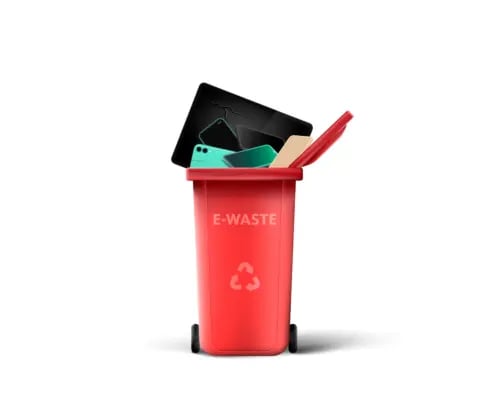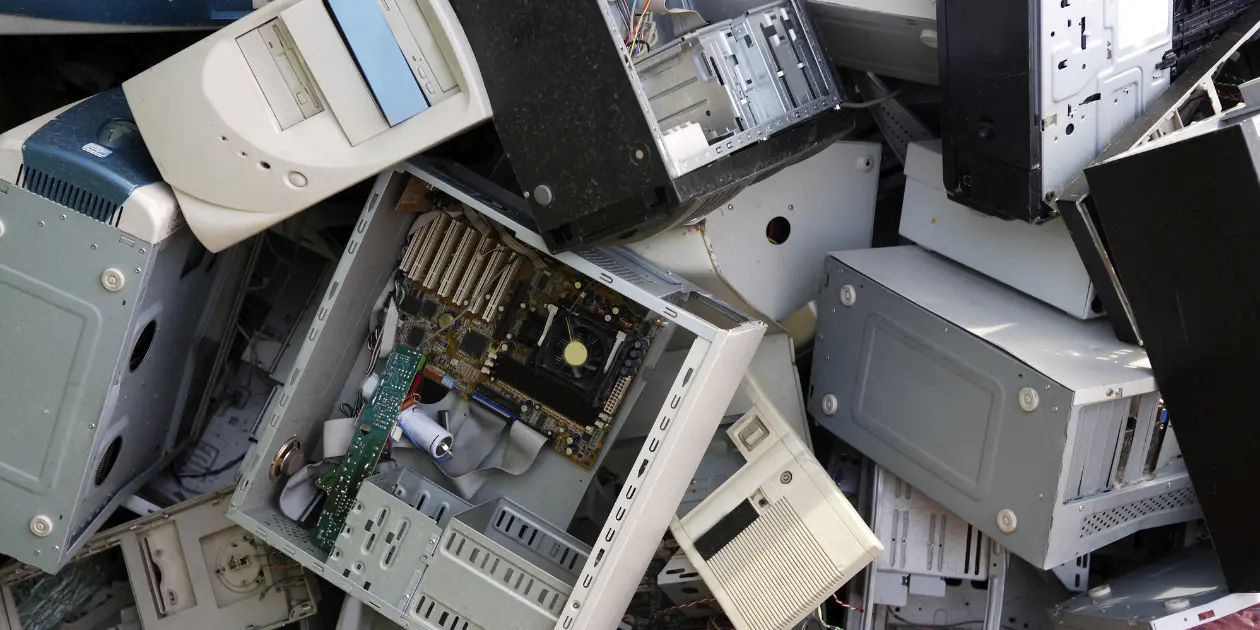An unfortunate truth about computer technology is that most equipment has a limited lifespan. Whether equipment breaks down from years of use or simply becomes outdated, it all must be replaced eventually. If you oversee maintaining computer hardware, you undoubtedly understand the challenges of computer hardware decommissioning.
When it’s time to discard old equipment, you don’t want to throw it away. Not only is it wasteful, but even if you think you’ve wiped everything clean of important data, discarded hardware still can present a major security risk to your company.
In this article, we’ll discuss why you should consider thoroughly destroying or recycling your hardware, the best practices for doing so, and how Prime Secured can help.
The Risk of Improperly Discarding Computer Hardware
The truth is, it’s not as easy as you might think to erase sensitive data from a hard drive. When you delete a file and empty your recycle bin, it doesn’t entirely remove the data that belongs to that file from your drive. Instead, it just deletes the digital pointers that tell a computer how to access that data.
Justin Ekstein, Solution Engineer with Prime Secured, explains this in greater detail:
“When you delete everything, you’re deleting the reference to the data but not the data itself. Until that data is overwritten on the hard drive, it’s still there and can be found with free software. Anybody with even a little bit of knowhow would be able to get that information back. And, if someone’s doing that, it’s probably for reasons that could jeopardize your security.”
Brandon Nyffeler, Prime’s Director of MSP Operations, offers a helpful analogy: “Imagine someone wrote down the alphabet on a sheet of paper. If they took a marker and scribbled over it once, you’d still be able to see the wording even if it might be hard to read some letters. You need to do it over and over, so no one can see the underlying information.” (See below on how that is done.)
For this reason alone, it’s important to make sure any discarded drive is properly and professionally wiped.
Am I Really a Target? Computer Hardware Opens a Door to Hackers
Some organizations make the mistake of thinking they aren’t a desirable target for hackers to bother with this kind of forensic data collection. But those organizations could be putting themselves at risk more than they realize by throwing old hardware into a dumpster. Strangely enough, dumpster diving for discarded computer equipment is a fairly common practice.
Even if an opportunistic enthusiast isn’t intentionally targeting your company, they may find sensitive data and decide to use it in a way that could damage your organization, such as using the names and contact information of real people to open fraudulent accounts. Once the equipment leaves your building, you’ve surrendered control over whatever information those devices contain.

In other cases, you may be violating regulations like HIPAA by not properly disposing of data. “Some organizations aren’t even aware they might be required to physically or electronically shred any data leaving their possession,” says Nyffeler.
The reality is—in one way or another—organizations that let their data loose into the world in such a way are increasing their risk, whether they’re a specific target for espionage.
Thinking Green is Responsible Decommissioning of Computer Hardware
The other problem with just throwing hardware into a dumpster is that it’s wasteful. Not only does it add to the problem of overflowing landfills, but it also eliminates access to valuable resources. The production of computer equipment requires the use of rare earth metals and other difficult-to-obtain materials that are nonrenewable resources. Recycling old equipment puts those materials back into circulation, reducing the world’s reliance on further mining.
“E-waste is becoming a real problem,” said Ekstein. “We’re always trying to get the latest and greatest phone or computer. A lot of people don’t think about how many devices they’ve personally thrown away over the years. It’s all taking up space somewhere and not deteriorating for hundreds or thousands of years. When we can recycle that equipment instead, it takes up zero room in the landfill and provides materials to make new equipment.”
Recycling old hardware is the most responsible thing to do, both for your own company’s security and for the planet. But how does it actually work?

How to Recycle Computer Hardware:
1. Identifying and Obtaining Computer Hardware that Needs Decommissioning
First you need to determine when it’s time to dispose of old hardware. At Prime Secured, we have a specific process to help grade issues and provide concrete evidence that a piece of equipment is not repairable or could cause significant risk if it is not replaced.
One way we help our clients is by obtaining the equipment. We can pick it up from the organization’s building and ensure that it’s securely transported, or organizations can transport the equipment themselves.
We then work with clients to ensure they haven’t left anything important on the hardware that they might want later. Once we’re sure everything they’ll want is securely stored in the cloud or on another device, we’ll start the process of wiping the equipment.
2. Wiping the Drives of Defunct Computer Hardware
We recommend using a software to perform what’s known as a Department-of-Defense-level wipe. This writes and rewrites every section of the hard drive repeatedly with random data, obscuring any trace of what was previously on the drive.
If you think back to our previous example with the sheet of paper, this is like scribbling all over what you wrote again and again so the letters can’t be read. Even if some of the original writing is there, it will be impossible for anyone snooping to make sense of it.
When the equipment is wiped thoroughly, it can be safely reused. The parts themselves may find new homes, or individual components may be used in the construction of new parts.
But some organizations may want an extra level of security. For those clients, we can ensure the equipment is completely destroyed so clients know without a doubt the data is completely unretrievable.
3. Destroying Old Computer Equipment
When complete destruction of computer hardware is necessary, Prime Secured works with partners to thoroughly break down the equipment into its base components. While the DoD-level wipe makes any retrieval of data unrealistic, complete destruction of equipment won’t leave anything to retrieve it from.
The raw materials that were used to build the equipment will then be recycled and used to build other machinery and hard drives.
4. Capturing Records Left on Old Computer Hardware
When wiping or destroying old hardware, you'll want to assemble detailed records of the equipment to make it easier to understand the fate of everything that has left your organization. This includes serial numbers of equipment destroyed and a description of what was done to the machines and on what date.
This information can be very useful in the case of a compliance audit, making it easy to confirm that you have been responsible with your equipment by deleting or destroying any sensitive data. In the event of an information leak, you also can easily rule out the discarded equipment as a source to help you pinpoint where else security measures failed.
5. Dropping off at a Location that Accepts E-Waste
The last step is dropping off your old computer hardware to a place that accepts computer parts. Often stores like your a loca; uBreakiFix will accept your E-Waste but you may have to do a quick Google search to find a location in your area, for locations in the Omaha area you can drop off your computer hardware here:
Don't Throw Your Data in the Dumpster—Securely Destroy It
Simply deleting files from a hard drive doesn’t truly erase them—it takes much more to genuinely prevent anyone from getting ahold of that information and misusing it. If equipment isn’t properly disposed of, it could viably result in a major security vulnerability for your organization.
In addition, it's better to focus on the preservation of natural resources used in electronics and recycling or destroying old computer equipment is the responsible thing to do, both for you and for society at large.
Prime Secured works with our partners to wipe data as thoroughly as possible, helping you comply with information security regulations, obtain greater control over your data, and be a part of an important environmental solution. It’s just one of many services we provide to our managed services clients. If you want to know more about how Prime can help keep your organization’s data secure, learn more at our managed IT services page.
Our Blog
Subscribe to the Prime Secured blog to receive the latest updates.

